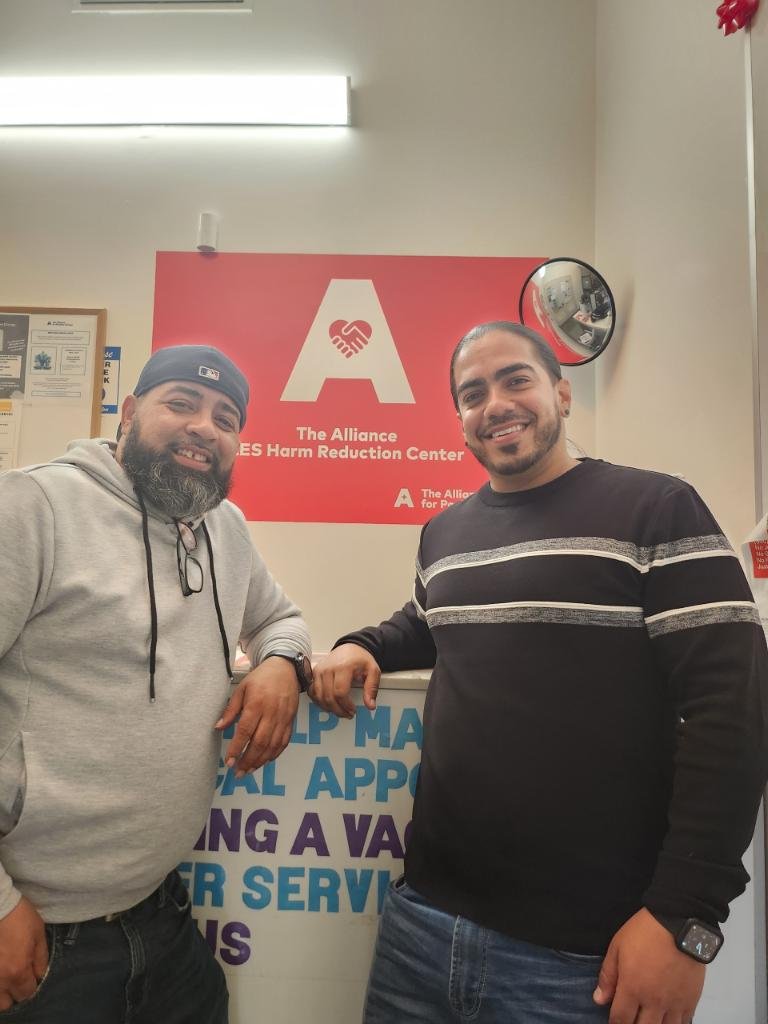1. Can you share a little about who you are, and what do you do?
Niko: I’m Niko Flowers. I’m a health educator. I’ve been working for Alliance for Positive Change for two years, and I’ve been a spokesmodel for HIV Stops With Me for 10 years. I’m the 4th floor receptionist at Alliance for Positive Change Midtown Central. I’m also involved in our Health Homes Care Management, helping people get connected with services.
2. You’ve been providing HIV awareness trainings for a long time, right?
Niko: Oh yes, for over 20 years. I’m 34 years of living with HIV and I’ve always wanted to help remove stigma by sharing my story. I’ve led trainings in schools, disclosing my HIV status to young people to make them aware. I became a health educator so I could be more than a speaker and also break down HIV 101 for people to really understand it, prevention and treatment.
3. And you’re a prominent spokesmodel with HIV Stops With Me. What is that?
Niko: Yes, I’ve been a spokesmodel for 10 years now. HIV Stop With Me is a New York State advertising campaign with a mission is to encourage testing, awareness, and treatment. We have 30 spokesmodels across the state appearing in glamorous, educational billboards. Because of stigmas, people still don’t know their status, and HIV is totally manageable today. My HIV levels are undetectable, which means it is untransmittable, and everyone can get there with testing and treatment.
I’ve been involved in it for 10 years now. We put advertisements across billboards and public spaces, i.e. train stations, bus stops, and subways.
They look for people who can talk about their experience and have really made it their business to educate themselves on their conditions. So we do annual trainings, then get dolled up and have fun photo shoots to destigmatize being open about your status, because there is still stigma.
4. How did you get involved with HIV Stops With Me?
Niko: About 10 years ago I saw an HIV Stops With Me ad on 14th Street of someone I knew. I asked them to connect me with it. I wanted to be a more public messenger, and the group that runs it saw I’m in it for the right reasons, so like all the spokesmodels I participated in annual trainings, shared more of my experience, which you can read about at Niko - HIV Stops With Me. And of course we take fabulous photoshoots that appear on ads in subways, billboards, and everywhere. I’m not ashamed and I think that helps remove stigmas.
5. What’s your favorite photo campaign from HIV Stops With Me?
Niko: That’s so tough because I really love them all. Can I say two of them? It's between “Slay” and “Hardcore Treatment Advocate.” “Slay” was from 2023 and I think “Hardcore Treatment Advocate” was from 2019.
The message on “Slay” is “Meds keep me Undetectable and Untransmittable. I manage my physical, mental, and sexual health. I’m slaying HIV.”
That one was all over the trains in the city. I never saw it but lots of people saw it. I just saw the new campaign “CEO of My Life” on the subway in Brooklyn, which was pretty cool. We’ve got all the ads on the walls here at Alliance.
6. When did you first come to Alliance?
Niko: March 2023. I came here to work on a program we had with Tangelo, a food delivery service for people with chronic health conditions that helps them stay healthy. I loved it, and I loved my boss, Ox. I love Ox for his work ethic, patience when I’m trying to learn new skills, and the trust.
Before 2023, I took the Certified Peer Recovery Advocate training. And last year I took the Peer Recovery Education Program (cycle 62.)
I knew most of the information. Our trainer Ms. Joyce was like ‘Niko you already know this information but you’d be good for the other people in the training, so come in.’ So I’ve always been about continuing education, especially for health care issues.
7. What motivates you day-to-day at Alliance?
Niko: Being present for this moment in time. Once it’s gone, it’s gone forever, so I try to be my best self, and help out everyone here at Alliance, my coworkers, my bosses, the participants we serve, because everyone has unique challenges, and helping people find the best programs for them brings me a lot of joy.
8. What do you do for fun?
Niko: When I’m not modeling, haha? I love reading, and watching TV and movies. Sometimes when I’m watching a good movie, I’ll be able to accurately predict what a character’s about to say. Right now, enjoying I’m watching Beauty in Black on Netflix.
9. If you could do anything in addition to what you are doing now, what would it be?
Niko: I’d do more health education in schools like I used to. As a matter of fact, I’m going to make some calls today and get back to that before the school year is over.
















